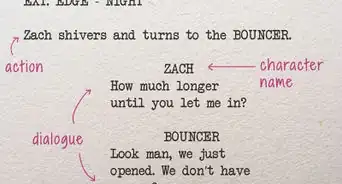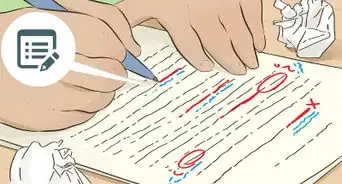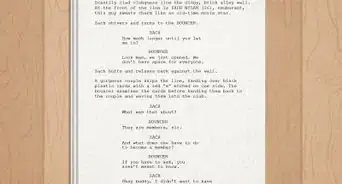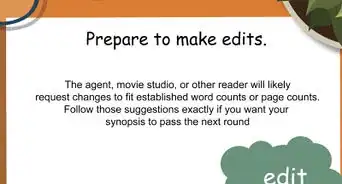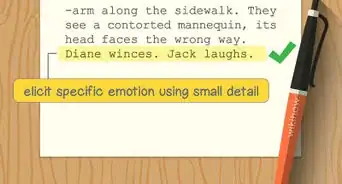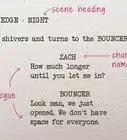X
wikiHow is a “wiki,” similar to Wikipedia, which means that many of our articles are co-written by multiple authors. To create this article, 27 people, some anonymous, worked to edit and improve it over time.
This article has been viewed 349,292 times.
Learn more...
Learn how to write a story for a movie with these steps.
Steps
-
1Supplies. You should gather everything you will need to write this story. You should get pens, pencils, paper, erasers and a pencil sharpener.
-
2Think. You should sit back and let your imagination run wild. You should imagine what you want the story to be like. There are many ways to gather ideas for a story, be it inspiration from your life, the world around you, or the works of other film makers but it is important you think outside the box and try to bring something new to the world. Try your best to come up with an idea that you and others would enjoy, ensuring that is worth all the effort writing the script will entail.[1]Advertisement
-
3Decision. You have to make a decision and decide what kind of story you want to write. If the plot to the movie is given to you already then build upon that.
-
4Build. You have to construct the story from scratch. If you want ideas then you should read a few books that have to do with the plot of the movie. This will give you an idea of what to write. Possibly the most important aspect of this step is ensuring that the frame of your story has no big conflicting story points or plot holes in it (unless put there intentionally *a dangerous move probably left to the professionals but if it works out, go right ahead*). This simple self criticism could save you hours if not days of hard work in the future trying to rework the tale so that it all makes sense later on when there are already details built upon the faults.[2]
-
5Draft. You should write out a draft for the story. You should review this yourself and decide if it is what you wanted. If it is not what you wanted then write another rough draft.
-
6Critics. You should show your rough draft to people you trust. Have them read the draft and tell you what they like or don't like about it. This way you know what you can correct or what looks good.
-
7Sample. You should write out a lot of pages for your story. You should have this around as a sample to show people your work. This will give people you are working with an idea of how the story is coming along.
-
8Edit. After you are done with your story, you can check it over and over again for mistakes. If you have the income take your story to an editor and have him or her review your story. If you have a professional who can review your story for free then go ahead.[3]
-
9Call. You should call all the important people you are working for or want to work for. Let them know you are done with your story. Setup a meeting and have them review your story.
Advertisement
Sample Script Outline and Script
Community Q&A
-
QuestionWhat if I show my drafts to people and they laugh at my efforts?
 Community AnswerIf it's supposed to be a comedy, be proud, but if not, be brave and take note of why they are laughing. Make sure that the people you show your drafts to are willing to offer sincere feedback so you do not get involved with someone who wants to mock you instead of help you.
Community AnswerIf it's supposed to be a comedy, be proud, but if not, be brave and take note of why they are laughing. Make sure that the people you show your drafts to are willing to offer sincere feedback so you do not get involved with someone who wants to mock you instead of help you. -
QuestionI have experienced so many things in my life, and I feel that I can bring something very new and fresh to the people. I am willing to write a story, but I don't know from where I should start, any suggestions?
 Community AnswerHave a clear picture about what you want to write. Start an outline, but be sure not to include too much, as your story can become convoluted with too many characters and events; your story should focus on a central storyline. Write a draft, set it aside for a week or so to distance yourself from it a bit (so that any errors become more evident to you), review it, and keep editing and polishing it until you're happy with it. Once you feel it's complete and at its best, begin submitting to editors.
Community AnswerHave a clear picture about what you want to write. Start an outline, but be sure not to include too much, as your story can become convoluted with too many characters and events; your story should focus on a central storyline. Write a draft, set it aside for a week or so to distance yourself from it a bit (so that any errors become more evident to you), review it, and keep editing and polishing it until you're happy with it. Once you feel it's complete and at its best, begin submitting to editors. -
QuestionCan young people write stories for movies?
 Community AnswerYes. Talk to a teacher for advice or find someone in your community to help you through the process.
Community AnswerYes. Talk to a teacher for advice or find someone in your community to help you through the process.
Advertisement
References
About This Article
Advertisement












